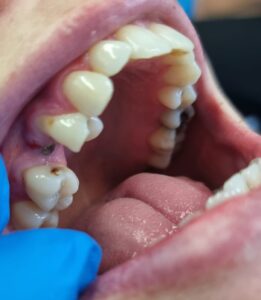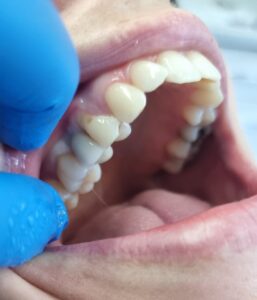Dental Implants
- Home
- /
- Dental Implants
Are you looking for a permanent solution to replace missing teeth? Dental implants at Larkham House Dental Practice are the answer you’ve been searching for. Dental implants offer a reliable and long-lasting solution for missing teeth, restoring both function and aesthetics to your smile.
Dental implants are titanium tooth roots surgically placed into the jawbone to replace missing teeth. They provide a strong foundation for fixed or removable replacement teeth, such as crowns, bridges, or implant-retained dentures, all designed to match your natural teeth. Dental implants not only improve the appearance of your smile but also enhance your oral health by preventing bone loss and maintaining the structure of your jaw.
At Larkham House Dental Practice, we make the dental implant process as smooth and comfortable as possible. Our experienced team carefully plans and executes each step to achieve optimal results.
At Larkham House, we offer a full range of advanced dental implant treatments. Some patients may require additional procedures, such as bone grafting or sinus augmentation, to ensure the success of their dental implants. We provide these advanced treatments in-house, eliminating the need for referrals to other specialists. Our use of the latest CBCT imaging technology allows us to precisely plan and execute even the most complex implant cases, ensuring the best outcomes for our patients.
We are proud to offer an Advanced Dentistry Referral Service, accepting referrals from both dental colleagues and patients for complex dental implant cases. Our team uses state-of-the-art technology and expert skills to tackle even the most challenging cases. Our goal is to see referred patients within 7 days of receiving the referral, providing prompt and efficient care.

BDS, Pg DipDCSc (U-Lon)LDSRCS (Eng), MFDSRCS (Ed)MCGDent, Pg DipPerio (U-Plym)
Dr. Vivek Giddani, a highly qualified and experienced implant dentist, will perform your procedure.


Please see our Smile Gallery to see some before & after cases of Implant treatment.
Are you ready to restore your smile with ? Contact Larkham House Dental Practice today to schedule your consultation. Our team is here to provide you with all the information you need and to guide you through the process of achieving a beautiful, healthy smile with implants.
Subject to age and status, minimum spend applies